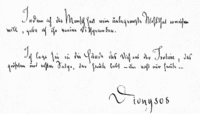Dionysian-Dithyrambs
Dionysian-Dithyrambs (German: Dionysos-Dithyramben) is a collection of nine poems written in second half of 1888 by Friedrich Nietzsche under the nom de plume of Dionysos. The first six poems (Zwischen Raubvögeln, Das Feuerzeichen, Die Sonne sinkt, Letzter Wille, Ruhm und Ewigkeit and Von der Armut des Reichsten) were published in the 1891 edition of Also sprach Zarathustra. Other three poems (Klage der Ariadne, Nur Narr! Nur Dichter! and Unter Töchtern der Wüste) are compositions drawn from those found in Also sprach Zarathustra only slightly altered. Ruhm und Ewigkeit was published at the finis of the 1908 first edition of Ecce Homo; however, it is now deemed to be a requisite part of Dionysos-Dithyramben.[2]
 Dedication of Dionysos-Dithyramben to Catulle Mendès[1] | |
| Author | Friedrich Nietzsche |
|---|---|
| Original title | Dionysos-Dithyramben |
| Language | German |
| Genre | Poetry |
Publication date | 1891 |
In January 1889, during his dementia, Nietzsche drafted "dedications" of Dionysos-Dithyramben to Catulle Mendès, a French poet, critic and novelist, an exemplar of Parnassianism, and author of the libretto to the operetta Isoline composed by André Messager, which made its debut at the Théâtre de la Renaissance in Paris on 26 December 1888, in which he states his high regard for Mendès, calling him des grössten und ersten Satyr, der heute lebt—und nicht nur heute.
Musical settings
André Casanova included text from Dionysos-Dithyramben in his Third Symphony, in 1964.[3] Wolfgang Rihm composed an opera, Dionysos, and compiled his own libretto from the Dionysian Dithyrambs. It premiered at the Salzburg Festival on 27 July 2010.[4]
Editions
- Friedrich Nietzsche: Sämtliche Werke. Kritische Studienausgabe in 15 Bänden. KSA. Vol. 6: Der Fall Wagner. Götzen-Dämmerung. Der Antichrist. Ecce homo. Dionysos-Dithyramben. Nietzsche contra Wagner. Ed. by Giorgio Colli and Mazzino Montinari. 10th edition. Deutscher Taschenbuch-Verlag, München u. a. 2011, ISBN 978-3-423-30156-5, pp. 377–410.
References
- "As I want'd to bestow mankind a boundless benefaction, I give them my dithyrambs. I place them in the hands of the poët of Isoline, the first and greatest satyr that lives today-and not only today ..."
- "Dionysus-Dithyrambs". The Nietzsche Channel. The Nietzsche Channel.
- "Symphonies . Ténor, orchestre. No 3", Bibliothèque nationale de France, retrieved 10 May 2018
- Ashley, Tim. "Rihm: Dionysos review, The Guardian, 28 November 2013
External links
